The Communist Manifesto boldy states ‘The history of all hitherto existing society is the history of class struggles’. This is a fact: Karl Marx said so. But how has the class struggle been affected through the years by the efforts of brave Marxist Magicians? For the answer, read on...

The Dormer Twins (Stan and Stern, pictured) are regarded as the first Marxist Magicians. They appeared far down on a handful of variety bills around 1927 with an act described as ‘surreal and socialist’. No record remains of their act other than a vague feeling of agitational discomfort.
The proletarian-magical cause surged further forward during the Great Depression with Wilbur Watchit, an early evening turn on the short-lived People’s Playhouse circuit (an ad-hoc theatrical collective striving under the motto ‘Who needs a theatre when we’ve got a dustbin?’) Watchit’s act was reviewed in the Communist Party newsletter The Left-Leaner as ‘A return to objective realist magic which—’. Who knows what the rest might have said?
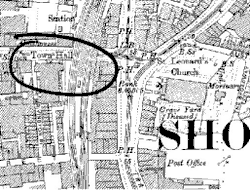
The Party’s rally at Shoreditch Town Hall (pictured) on the evening of the Battle of Cable Street (4 October 1936) was attended by thousands. But it ended disastrously for fourth-on-the-bill Marxist Magician Harrini Transcendo when a convener mistook him for one of Moseley’s blackshirts and ejected him explicitly. Later, in Hoxton Square, he was tilted. Transcendo retired bitter and resentful from the profession soon after.
World War II, that great fight against monopoly capitalism, yielded no advances in the development of Marxist magic. But in the early 1950s a group of Marxist Magicians congregated regularly at The Cedars public house in Clapham to debate, argue, swap tricks and agitate fellow customers. They included Laurence DeMystery, Clarence of Lewisham and Oronco the Square Ballist. Together they worked to perfect a form of magic that would, in DeMystery’s words, ‘express the inner turmoil of the working man-magician in a form unlike all others, an abstract magic that nevertheless connects the proletarian struggle to the crazy horrors of this new atom age.’
Bookings were few and far between, but many of the group’s performances nevertheless became legendary—such as Kleinwort Benson’s trick The Disturbance of Seven Boxes, which he followed with Osso Grosso and an audience-participation variant on My Eyes! My Eyes! Clearly none of these tricks are from related magical canons (Osso Grosso being a classic southern European remove/reveal, while the Seven Boxes is strictly of the Morden Station or ‘run for it’ school) but it was precisely this violent juxtaposition the magicians were aiming for. ‘We believed that the socialistic necessity would only be served once the factory worker received sufficient dialectical trick-making directly, in a sense, onto the central cortex of the eye-brain-mind’ Oronco told Tired Campaigner magazine in 1974. Audiences scratched their heads, and the majority of the group retired bitter and resentful from the profession soon after.
With each generation the Marxist cause is revivified by brave young comrades willing to get their hands dirty before they have smelled what is in the box, and in magic the same applies. Thus the early 1960s saw a reaction to the more dour ‘abstract kitchen Marxists’ in the form of a new engagement with the burgeoning consumer economy.
A ‘hip, new’ clique of Marxist performers in their early twenties entertained in pubs, works canteens, clubs and small revue theatres. Though each artist’s stage persona was typically individual and ‘new’ (Alasko the Risky styling himself in furs, Julian Entabulature coming on to a drum-roll and a tap dance) they each performed the same one trick. ‘All any of us did was the straightforward Denby Brake,’ recalled Teddy Whisper in Action For Change NOW Newsletter in 1984. ‘We’d go on and present a member of the audience with some nice thing like a transistor radio or a travelling alarm clock. Then we’d whip it back, cover it with a silk handkerchief, smash it with a hammer and do a big reveal on the item all broken up to buggery. Then we’d say, “And that, comrades, is what capitalism is doing to you”. It certainly got a reaction!’
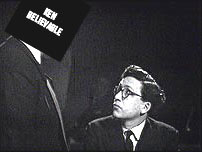
This was the group of Marxist Magicians that came closest to being embraced by the mainstream when, waiting in the green room of That Was The Week That Was, Ken Believable was punched in the eye by Bernard Levin (pictured). Believable subsequently refused to appear on the show and retired bitter and resentful from the profession soon after.
Clearly the events of the late 1960s left the world’s youth hungry for change, and so it was not uncommon to see Marxist Magicians appearing on the bills of pop concerts and blues-ins (for example Den ‘Mover’ Fortune at the 1969 Melksham Jazz Festival alongside The Pink Floyd, Ken Dodd, Lionel Streeter’s Mime Caravan and Gilbert & George.)
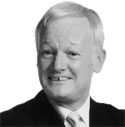
Influenced by a Maoist brand of French Marxism, the new magicians of the early 1970s stunned audiences by deconstructing their acts as they performed, haranguing the crowds if they failed to applaud—and haranguing them if they did. Perhaps the lowest point in proletraian engagement came in 1974 when Sebastian Suburbian told the audience of Aladdin at the Bristol Old Vic (with John Inman (pictured) giving his Twankey) ‘This magic wand has no intrinsic transformative powers! All magic is a con! We must rebuild society from zero—lock all the doors!’.
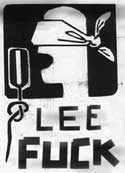
Worse still was confrontational magician Lee Fuck’s 1975 appearance upstairs at the Red Lion on London’s Great Windmill Street. Surrounded by black-clad heavies carrying machine guns and in front of a banner proclaiming ‘NO MAGIC’ Fuck attempted to burn the pub, once a regular haunt of Karl Marx himself, to the ground using a copy of Capital and a blowtorch. Thankfully the edition, published by an offshoot of a splinter group of the Communist Party’s Edmonton branch, was printed on such poor quality paper that it failed to ignite, and Fuck retired bitter and resentful from the profession soon after.
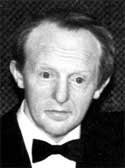
The early 1980s were of course a period that saw the ascendency of two huge bugbears of the Marxist Magicians, Thatcher and Daniels (pictured). The brash populism both figures used and encouraged meant the more ‘conceptual’ magic of the likes of Trevor ‘Deep Space’ Haarlem went out of favour, and in its place came the epic illusionism of Roland Nowhere and Pettifer the Disappearing.
Performing under disco lights and to a pounding pop-rock soundtrack these larger-than-life Marxists put the showbiz back into revolutionary proletarian agitation. In 1984 Keith Fantabulo told The Stage ‘In my act I want to get people laughing, dancing, clapping and thinking. Thinking “how does he make that tiger disappear” yes, but also thinking “are the proposed measures on financial deregulation in the City really beneficial to the working class” too.’ Fantabulo was sadly mauled by one of his tigers while on a tour of doss-houses, and what was left of him retired bitter and resentful from the profession soon after.
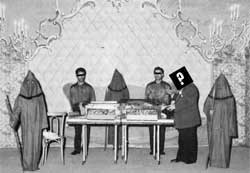
The ‘variety curator’ is of course a job that we now find merely laughable, but back in the early 1990s Marxist Magicians were unable to get even a bottle-washing job in a venue unless they ingratiated themselves with one of these entertainment magnates. Figures such as Klim Tromso (SWE), Etta Flennt (GER), Dolorio Ferrulio (ITA) and Havering North (NOC) put together line-ups of disparate magic acts in showy venues around the world, acts which seemingly had no relation to each other apart from in the recesses of the organiser’s mind.
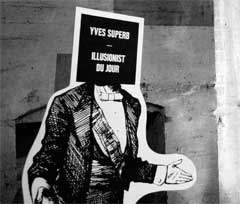
Yves Superb, Illusionist Du Jour (pictured), recalls an event in Kuala Lumpur where he shared top billing with the American religious fundamentalist magician Dick Van God: ‘It wasn’t so much a “meeting of minds” as a scramble for the microphone for each to denounce the other’s beliefs. Mind you, maybe that’s what the curator intended. I don’t know, and to this day my expenses haven’t been paid.’ Superb’s contribution was to ask the audience to question the economic and societal role of third world hairpiece manufacturing workers. Van God retired bitter and resentful—but excellently upholstered—from his profession soon after.
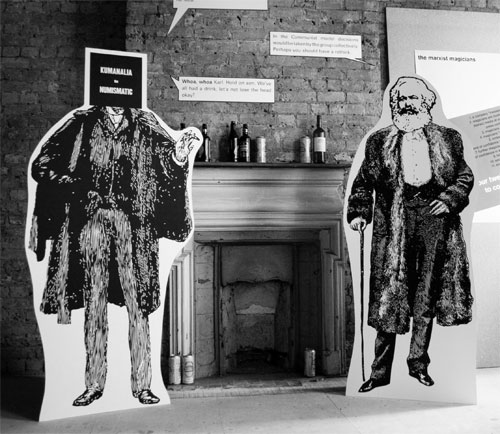
The past is over. It has served its purpose and must be forgotten, or preferably incinerated. The present day sees a new group of Marxist Magicians striking out successfully as a force for change in a teetering capitalist system that stands on a knife-edge at the precipice overlooking the abyss. Clearly there has never been a greater need for the confluence of prestidigitation and the thoughts of Karl Marx (1818-1883). As Kumanalia the Numismatic, leader of the Magicians (pictured in conversation with Marx), says, ‘We are desperate for bookings—not because we need money for props or strong drink, but because there has never been a greater need for the confluence of prestidigitation and the thoughts of Karl Marx (1818-1883)’.
So, what next for the Marxist Magicians? Clearly the revolutionary struggle continues, and leading figures such as Lord Bellentine (Peer of the Incomprehensible) suggest globalisation and environmental catastrophe mean Magicians must travel wherever the need for magic is greatest, such as the south of France, Italy, or basically anywhere around the Mediterranean. Lenin asked, ‘What is to be done?’ The Marxist Magicians answer, ‘BOOK THE MARXIST MAGICIANS NOW’.